With perhaps only 0.5% of the world’s population sailing regularly—and far fewer cruising aboard small sailboats, and fewer still writing about their adventures—it’s no wonder that truly good new sailing books are so rare.
But every now and then, a book appears that lands squarely in the cockpit of our little subculture. A Dyslexic Venturesome Voyage is one such gem. Written by Sven Yrvind (formerly Lundin), arguably the greatest small-boat adventurer alive, Venturesome Voyage is as eccentric, compact, and endearing as its author’s tiny vessels. In just 109 pages, the book traces Sven’s early life, his first sea journey, and some of the many far-flung adventures that have taken him everywhere from jail to the most remote places small boats have ever reached.
The book is also beautifully illustrated with gouache and India ink sketches by artist Pierre Hervé.
Below is an excerpt—the chapter called Bris about his famous boat.
The author and artist have generously offered us one free copy to give away to a Paid subscriber—if you're interested, let us know in the comments below, and we’ll choose one person at random to receive the book. You can also order your own copy on Amazon here. At the end of this article, you’ll find a link to a video about the book.
We interviewed Sven way back in print issues #21 and #22. Those interviews are also published in our book Small Boats Big Adventures.—Eds
I had been away more than a year on the big boat and among the many things I had learnt was, a bigger boat doesnít make you happier, but it cost more not only to build but also in upkeep. It is also more difficult to manoeuvre and find a place for in harbour. It shore has many advantages like speed and carrying capacity and prestige but they did not mean much for me, so weighing it al together as one has to do I understood that my values and my heart favoured the small one.
I lived in the attic of my mother’s house. Mother was glad to see me back. I told her I wanted to build a small ocean going boat and asked if I could do it in the back yard. It is always interesting to see you doing constructive work she said. The neighbours who had been a bit surprised that the good for nothing son next door had crossed the Atlantic in a converted steamboat was of the same opinion. It had been in the newspapers.
To get shelter from the weather I put up some tarpaulins between the apple trees. It did not take long before the city planner was there asking me if I had permission.
“I shall only build a small boat, then I take down the tarpaulins and go sailing.” I answered.
“Have you been thinking about what would happen if everyone did like you ?” He asked.
“What would happen if everyone was a town planner?” I said.
That made him indignant. He forced me to take down the tarpaulins. In the evening when mother came home and heard about it she got mad.
“Sven” she said “Make the boat a bit smaller, clean out the cellar and build her there. Then in the spring we dig her out.”
The cellar was not very big but neither was I or my needs. The biggest problem was that the house was very old and rested on a solid foundation of good Swedish granite stones, three feet thick. The cellar was four feet underground.
From the outside there was steps leading down to a small door. It was through that door the boat would have to be taken out. So one of the fundamental design requirements was how to draw an ocean going yacht small enough to go through that small non-flexible door.
Finally I had worked out that the bout would be 20’ long 5’8” beam. She had two unstayed masts with lugsails and a centreboard for shallow draft. It would be a could moulded construction, a technique I had learnt at Souters in Cowes. Her bottom would be cowered with latched lockers to keep provision secured in storm and its weight low. That would give me three feet headroom except for a small foot well. She would be unsinkable thanks to the first and last two feet of the boat being filled with foam. She would have one and a half inch foam insulation, which apart from adding buoyancy, also gives insulation.
On the 21 of June 1971, I started to build her. It was the lightest day of the whole year and is widely celebrated throughout Sweden.
I named the boat Bris which is Swedish for breeze also similar in German, French, Spanish and other languages, making it simple to explain. I had gotten tired of explaining the name of my previous boat.
As usual when building a boat everything takes much longer than estimated. Much of this was due to my limited economy. Autumn passed but before Christmas Alan was back. He had sold the steam launch in Florida. That gave a boost to my economy. I paid back the money I owed mother for the airplane ticket, Rio - Sweden and still had enough to continue into the spring. As the building progressed more and more visitors arrived. The boat grow and grow took up more and more space. Even the nicest were tempted to comment on how impossible it would be to get the boat out. Most of them also told me their version of a man who built a boat in his cellar and did not get it out.
In the beginning of October the big day finally arrived. The boats superstructure was unscrewed. The door and its frame were removed. One of the granite stones supporting the house sticking out a bit more than the others was chopped of. A man with an excavator working nearby was given a kilo coffee to remove the steps leading down to the cellar and digging a canal a bit out into the back yard. With the help of friends we succeeded in squeezing out the boat.
To my horror there was a leek around the centreboard. It was very late in the season but after all the work I did not want to experience another Swedish winter. This time I planned to sail by way of Cape Horn against wind and waves into the pacific. Not many believed in me, one practical man less than the others. He was an entrepreneur interested in sailing. One day he had knocked on the cellar door shown interest in my project, he had come back few times and given me help and advises; a nice person. One day he suggested a deal. He would give me a thousand dollars. All I had to do was to go sailing. He would with my permission take out a life insurance of twenty thousand dollars on me in his name. I accepted eagerly. What could I lose? We went to a doctor and got a health certificate, then to the insurance company and signed papers. That was all.
A windy day with a cold northerly day I left Sweden. Among the people who waved was my friend the entrepreneur. Now the second serious error showed up; Bris started to build up a tremendous sometimes up to sixty degrees to each side, due to the momentum of the heavy unsupported masts. A mast builder had made them for me. I had made some strength calculations and given him the weight and dimensions, twenty pounds each. He delivered some beautiful super strong masts; their only problem, they were to heavy; thirty ponds instead of twenty. Worried, I continued trough Germany to Holland where I met Jannike a modern independent girl full of curiosity. She already had a boyfriend but she had already told him plainly that jealousy was a bourgeois invention which she did not accept. She told me the same thing. I had to accept her as she was if I wanted to be together with her.
I had now realised that I had to do something about my problems. Some friendly people let me keep Bris in their barn so that I could work on her, but I was depressed and disappointed and instead of working on the boat spent more and more time with Jannike. One day when we walked around in a big bookstore I suddenly felt very dizzy. I began to sway. I put out a hand to steady myself but was to week I fainted and dropped to the floor. When I came to after a few moments there were a lot of people around me including Jannike and a nurse taking my pulse; timing it, I noted curiously, despite my weakness with a miniature sandglass. Jannike told me excitedly that an ambulance were on its way. I protested weekly but Jannike would not hear of it. Soon we were on your way to her room. The ambulance men carried me to her bed on a stretcher. Now Jannike took over and nursed me back to health. Soon I was strong enough to make love; her other boyfriend was forgotten.
Of course the situation was untenable I had to do something about the boat. By selling some unnecessary and heavy equipment like the anchor winch and some chain I got some money. I said goodbye to Jannike and hitch hiked back to Sweden, where I had to endure a lot of “I told you so.” A friend lent me a car I rented a trailer and drove to Holland to pick up my boat. The first thing I did was to knock on Jannike’s door. No one opened but I know where the key was so I let myself in. It was a real bummer. I went everywhere I ask all her friends but no one had seen her for many days. Finally after three days I just had to go back with my friend’s car the rented trailer and my boat.
I was very tired when I was back in Sweden. When I knocked on my mother’s door, Jannike opened, on her arm was my sister’s baby daughter. Our ways had crossed each other.
I had spent the winter in Holland. It was now spring. Without shelter, to please the city planner, I removed the centreboard and its case. I put on a short fin keel. A caretaker friend whose house was being rebuilt let me have some old pine steps for the deadwood. I cast a 250 lb. lead keel of ancient organ pipes in a mold of plaster of paris. Proctor’s mast gave me a second-hand 30’ aluminum mast very, very cheaply. I cut it down to 20’. The sails were recut and the boat rigged as a masthead sloop. I could not afford to do any more experiments.
Bris was relaunched. This time no water came in, not even enough to wet a postage stamp.
Jannike had given up her sociological studies in Holland and wanted to come sailing with me. We moved aboard and Jannike was excited and thought the whole thing was great fun. My grandfather had said.
“Outward bound, in the old days on the sailing ships, we always went north of Scotland west of Ireland. On that route with lots of sea roam we could take advantage of the shifting winds. Homeward bound with the predominately following westerly winds we went through the Channel.” My previous cruise through the North Sea, English Channel and across the Bay of Biscay with heavy traffic fog and sandbanks had given me second thoughts about that route. I decided to take the Northern route.
Finally a day in the beginning of June 1973 we were ready to sail north. The weather was bad, grey rainy skies with strong winds, but the winds were southerly and we were eager to get going, I because the long delay, Jannike because it was to be her first sail. We warped the boat along the docks pilings to its head were I hoisted the sails. Jannike were holding on to a pile. I went back to the steering position and told Jannike to let go. At the same time an intense squall hit us. The boat shot off like a rocket. I was not in complete control after the many profound changes which had been done to the boat, but managed get us out through the narrow harbour entrance after first hitting a number of dock pilings. Our course lies downwind and in sleeting rain we tore along at hull speed. Jannike clung on to the boat for dear life. Neither of us had any lifelines and of course Bris had no guardrail. The wind continued with the same strength for hour after hour. In the afternoon we tied up in the well protected harbour Marstrand.
“Now what do you think of this rough sailing ?” I asked Jannike.
“Rough?” She asked in surprise.
“Is it not always like this?” She continued.
When she had told friends of her intention to go sailing with me in my small homemade boat, they, for fear of loosing her, had all warned her of the terrible storms at sea and having herself never put a foot on a boat she, of course, knew nothing about it. Her vivid imagination had done the rest. She was prepared for the worst.
Weather makes a difference. The next day it was an ideal sailing breeze with nice worm sunshine. We continued happily among the many islands which gave complete protection from sea swell and offered a large number of natural harbours and all went very well. One day we were at the Koster Islands ready for a thirty mile crossing to Norway. The same nice breeze was giving us a pleasant beam wind. After a while the so ever vivacious Jannike became quit. A bit later she started to look pale, then al of a sudden she began to vomit violently. I was surprised true there was a sea swell but the weather was fine. She was kind of knocked out. The only thing she could do was to lie in the bunk and moan. Except for Jannikes seasickness the crossing was uneventful and after a few hours she was her old self again, gay as ever.
I however was brooding. I knew that the passage north of Scotland west of Ireland down to Madeira would be a rough one. I know that the chances of running into extended periods of south westerly gales were great. I know that the Hebrides and the Irish west coast would be to leeward and that I would have to fight my way to windward for weeks after weeks in order not to be smashed to pieces by heavy breakers against them. I know that once committed there was no turning back and no way of sending out a call for help. I did not think she could. If she had been that seasick in today’s sea swell I shuddered to think of what those gales might do to her.
I tried to explain, and I told her as gentle as possible that she had to leave. I followed her to the bus station and told her that I would write when I came to Madeira.
Without Jannike the boat felt unfriendly and cold. I felt lonely and wondered if I had made the right decision, but Jannike was gone and I had to fight on like a man. I continued to the southwesternmost point in Norway. From there I set my course for the Shetland Islands.
Wanting to leave the coastal traffic and fishing boats behind me as soon as possible, I took advantage of an easterly gale.
After tacking out of the long narrow entrance to the fjord where I had spent the night, banging into the seas, I could soon turn round a headland, lay my course and ease the sheets.
I wanted plenty of speed so I carried a lot of sail. My biggest jib was boomed out and Bris surfaced down the waves. Sometimes she heeled over a bit too much and the jib touched the water. But as I had built a strong boat I carried on. Suddenly the jib dug deeper into the water, there was a bang and the jib boom exploded into three pieces, the middle one quickly floating away, the two other pieces hanging on to their fittings. This, only a few hours after leaving the mainland was not a good start; but I carried on. Not yet knowing her well and able to balance her, I hove to a bit after darkness, this my first night out, to tired to continue. I had no selfsteering.
Next day brought good weather; in fact I was in a high pressure area with light winds. Bris has always been able to move quickly in such conditions. Now with the sea calmer and the boat not so overburdened I was able to get her to steer herself by jamming my heavy walking shoes upside down under the steering wheel.
After not too many days of good weather I could see Fair Isle, a little island between Orkney and Shetland Islands. Encouraged by having crossed the North Sea so quickly and having made such an excellent landfall and eager to continue, I felt I had already won half the battle and it would not take long to reach Madeira. Looking at the map it seemed to be all downhill from now on. There were still some of the fresh groceries left, so full of confidence I went straight out into the Atlantic without stopping anywhere to fill up with food.
The sky was becoming a bit grey as dusk fell and Fair Isle lighthouse was sinking into the water. I entered the Atlantic leaving the North Sea behind. It was June 21 the longest day of the year. The big swell I met gave me a forewarning of things to come.
The next day it was drizzling and the wind was against me and getting stronger. Not wanting to have the Hebrides and their fishing fleets to close I chose a west northwest course to get more sea roam. The wind increased to gale force and I changed down to storm sails
Now followed three weeks of nearly continuous gales which took me up to 62º north, near Iceland.
It turned bitter cold. But I just had to keep fighting the weather. I carried as much sails as I and the boat could stand. Waves were banging into the boat with mighty force. One of them was catapulting the boat to lee, knocking her down about 80º, throwing mugs, saucepans and other things from one side of the boat to the other. As I opened my hatch to see if the mast was still there I noticed that the log line was on the windward side coming up from under between the fin keel and the rudder. Bris must have been thrown at least 10 feet backwards and sideways over the log line.
Another time on a dark night I was on deck to reef the already small trysail, standing close to the mast with the boat going downwind to get a dryer deck. No one at the helm of course. I was facing aft when I saw and heard the breaker of a big sea coming fast toward me. There was no time to run back to the tiller, so I did the only thing possible. I sat down on deck knotted my legs and arms around the mast, held on for dear life and hoped for the best. The breaker caught up with the boat and Bris, riding the breaker, started surfing down the face of a very steep wave. The speed and noise were tremendous. Each moment there was the danger of broaching to. Luck was with me and I arrived at the bottom of the wave in one piece, still holding on to the mast, hundreds of feet of white foam behind me. I completed the reef, turned the boat to windward again and went below to my bunk. Pain in my back made me realize how hard I had held onto the mast.
There were times when the rough conditions tempted me to take the easy way and turn around and run with the wind to stop the endless brutal banging into the waves caused by the necessary hard driving, but the easy way out seldom leads to success and I already had one failed start behind me.
I had also problems with food. Conveniently, a supermarket in Goteborg caught fire a few days before my departure and the company sold everything that had been close to the fire for half the price. I bought forty cans of Swedish meatballs. But after three weeks of in severe gale conditions and meatballs every day I began to have second thoughts about my favourite food.
Unbelievable to me at first, but finally after having been driven up to 62º north near Iceland, the gales started to have a northerly component in them and I could ease the sheets, pick up speed and enjoy the absence of banging. I was now also much better at balancing the boat so that she could steer herself on almost any course. Also that contributed to the speed.
As I came south, sweater after sweater came of, but it was not before I reached the latitude of northern Spain that I went on deck and had a proper wash.
Some more miles had to be run but eventually the high island of Madeira was sighted one morning. Darkness fell before I could make Funchal, but as I knew the easy harbour well I entered and dropped the two required anchors at the same spot I had occupied for years earlier in the converted steamboat. I noted that the time was four a clock in the morning. The passage had taken forty five days. I was slim and fit and the boat had stood well up to all the gales.
Though very tired I was too excited to sleep long. I was early up cleared customs, changed some money and quickly made for the market with all its beautiful tropical fruits. The reader needs no great imagination to realise how lovely they tasted after weeks of fire damaged Swedish meatballs.
Madeira was still as nice as I remembered. I had a good time, weeks went into months. Having shallow draft like my previous boat, Bris anchored close to the town pier. From that viewpoint I had a close look at all the lovely girls strolling along. My thoughts went to Jannike she had written a few times asking to come along. I wrote her proposing we try it to the Canary Islands a few days in usually fine weather.
At the post office I met Gabi and Jurg two young German backpackers who had been camping up in the mountain, following the lavadas a network of beautiful irrigation channels. We compared experiences and they came with me to the harbour to have a look at my boat. When they left Gabi said Jurg is leaving tomorrow, but I am staying on for some time I hope to see you again. I surely did not want to get mixed up with another man’s girlfriend. Embarrassed I said nothing. After they left I thought it was strange that they did not leave together. Maybe they had been quarrelling I thought but also that seemed strange as they had been very nice to each other.
A few days later when I came back to my boat from the market I found Gabi waiting for me at the steps of the pier where I kept my inflatable dinghy. She was curious about my boat and way of travel she said so we went aboard. When I queered her about her boyfriend she told me that it was her brother but they were very good friends and spent much time together. Before I had mostly talked with him but now I found out that she was much into mathematics in fact she was doing her Ph. D. at Gottingen. It surprised me because very few girls are interested in mathematics and she was blond and beautiful and only nineteen years old. But mathematics is a subject for young people. Newton did his greatest work at 22 and Einstein at 25. We went along well with each other. We talked about the differences of Rieman and Lebegue integrals, about conformal mapping and its importance for two dimensional fluid flow, how Joukowski with a simple complex variable could transform a circle to look like an airfoil and about many more beautiful things which I have now long since forgotten. We talked about various ways of travelling and that old people who had money was too tired to travel while she young and eager to see the world hardly had money to backpack.
She thought it was fantastic that I could travel all over the world in my little boat with just the help of the wind and my oar. She realised it was quite clean and healthy life.
We spent the whole day together. In the evening I walked her back to her hotel. Next morning when I woke up I saw that she was sitting at steps to the pier. Now she had her small rucksack with her. I rowed over to pick her up.
“Sven” she said, “It is stupid that I spend the little money I have at the Hotel. If you let me sleep in the boat we could use it to buy some food from the market and take cheap local buses for day trips and I could show you some beautiful places up the mountains. When your girlfriend comes I go back to Germany to my research.”
I thought that as Jannike was a free modern girl and did think that jealousy was a bourgeois invention and had forced me to accept that she had a boyfriend besides me when we met in Holland she would in her turn have to accept that Gabi moved aboard.
So I told Gabi that she was welcome aboard. Time passed even more quickly now with Gabi aboard and one night when we had our evening meal there was a knock on the hull and when I opened the hatch there was a fisherman there in his rowing boat and on the back seat there was Jannike very happy to see me. She climbed aboard with her rucksack. When she came into the boat and did see Gabi she was not so happy of course. But the girls were polite to each other and it was decided it was too late for Gabi to try to find a hotel. There was only one bunk aboard Bris and it was only three and a half feet wide; a tight fit. We decided that we would sort things out tomorrow.
Next morning Gabi said :
“OK when I moved aboard I promised to leave when Jannike came, but then I did not know what I now know. Now I have become attached to Sven and Bris and this free life in a small boat. Now I am dreaming of the big oceans and the far countries and all the exciting things Sven have been telling me about. I do not want to go back to the bourgeois society in Germany and continue my mathematical research. I want too come sailing with you.”
One man with two girlfriends on a small boat like Bris was definitely too much, but sometimes fate arranges constellations beyond your control. When Gabi moved aboard for a few days I did not know that it would change her dreams. Now I felt responsible for her.
I felt responsible for Jannike too. True she was a brave modern girl with no faith in traditional relationships, but I felt that this was a bit much even for her. On the other hand once out on the ocean wave maybe seasickness would force her to leave the boat anyway. After much deliberation we decided to give it a try. The girls went to the market and bought food. I dived into the water and cleaned the hull and started to make the boat ready for the sea after her long stay in port. When everything was stowed away we went to the customs and cleared for the Canary Islands. •SCA•



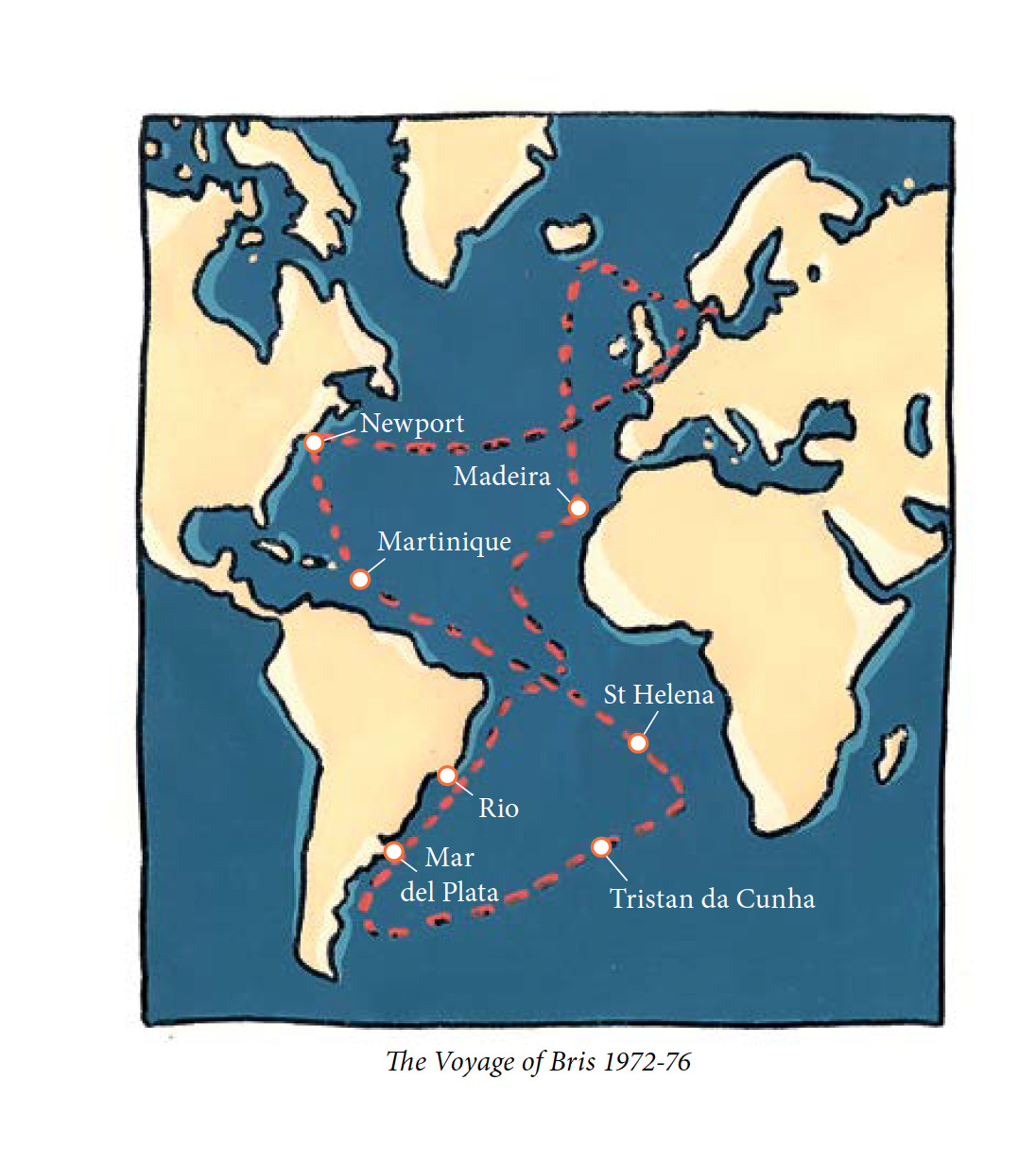
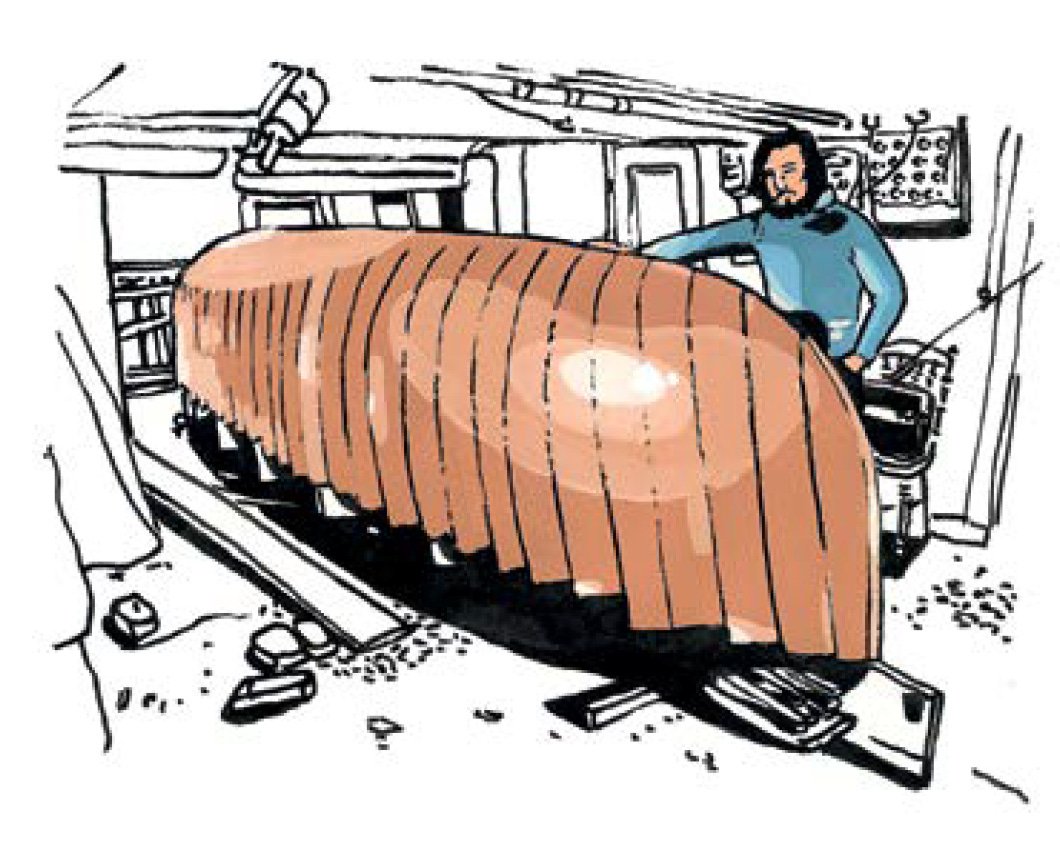
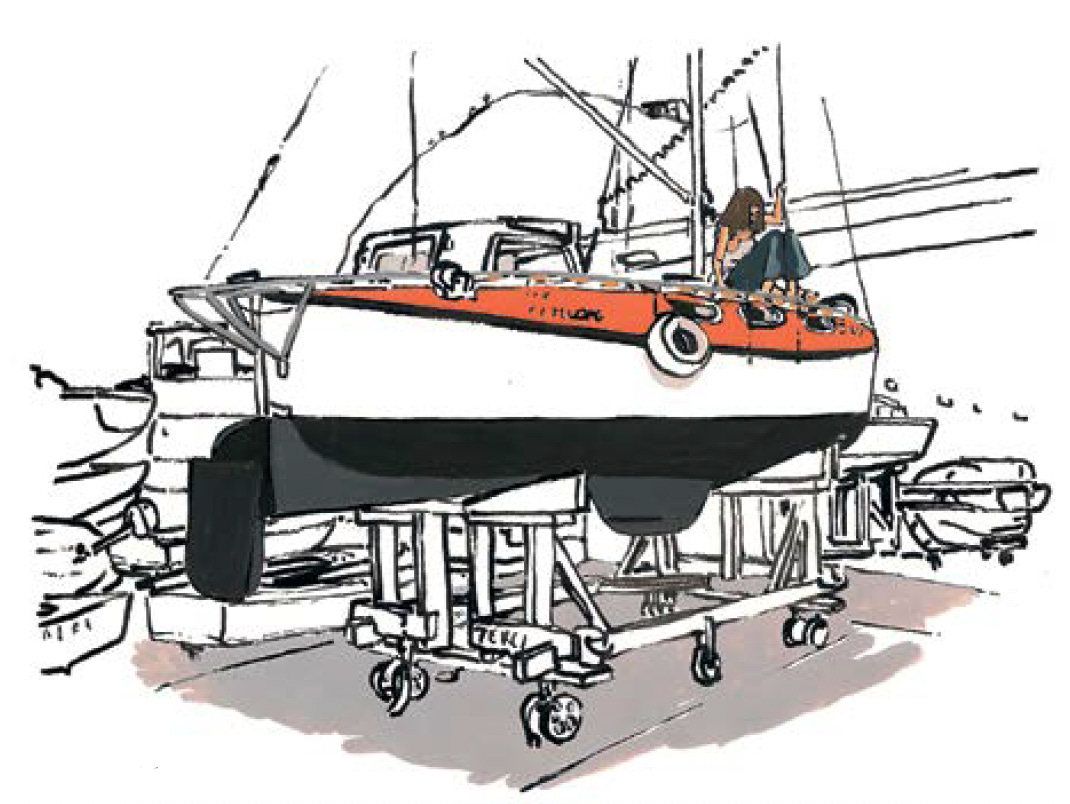
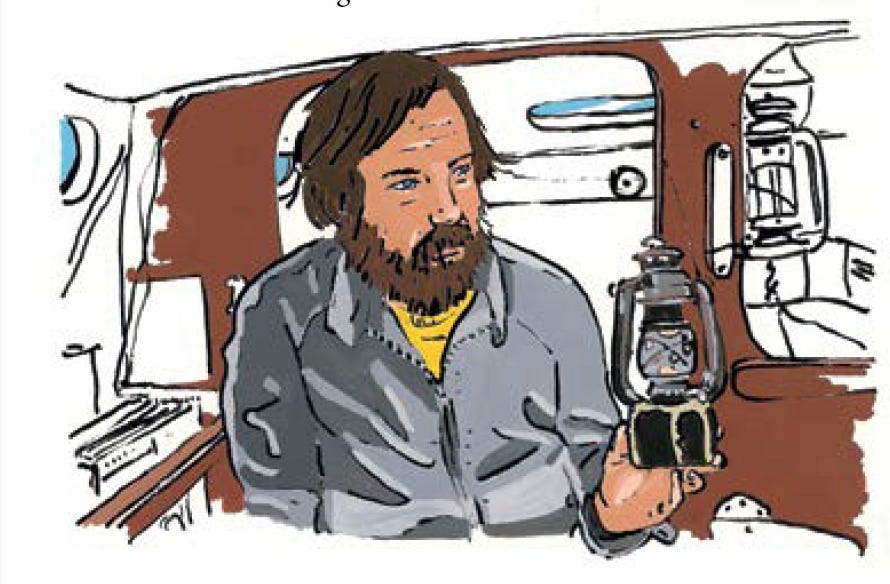
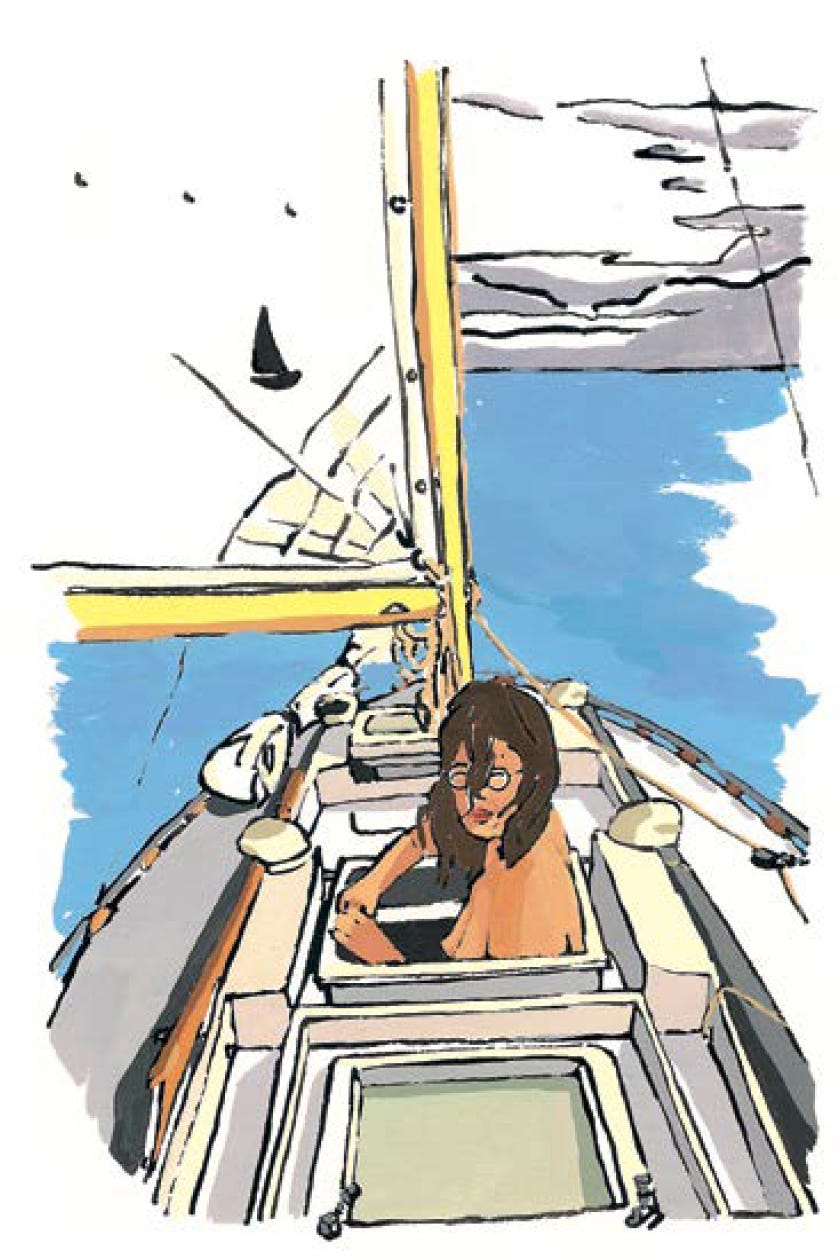
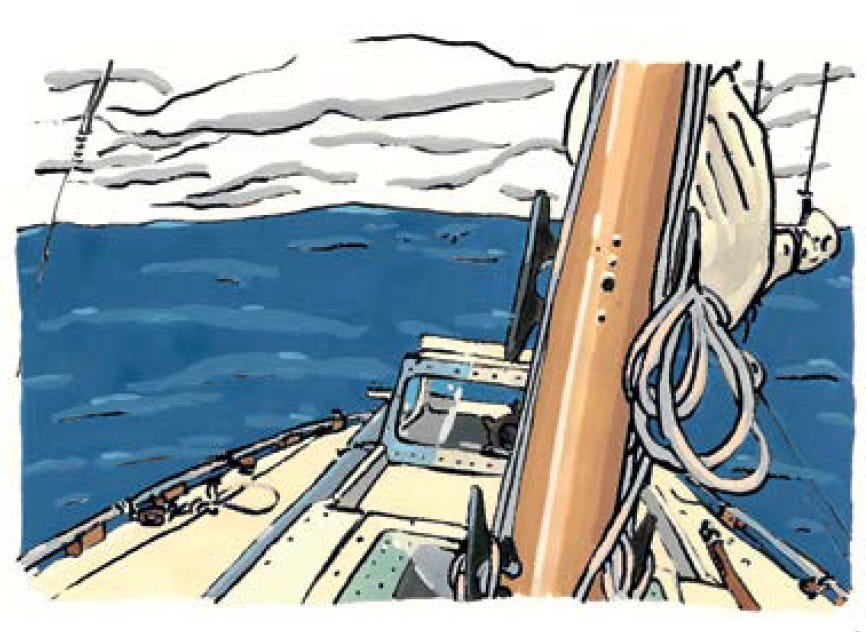
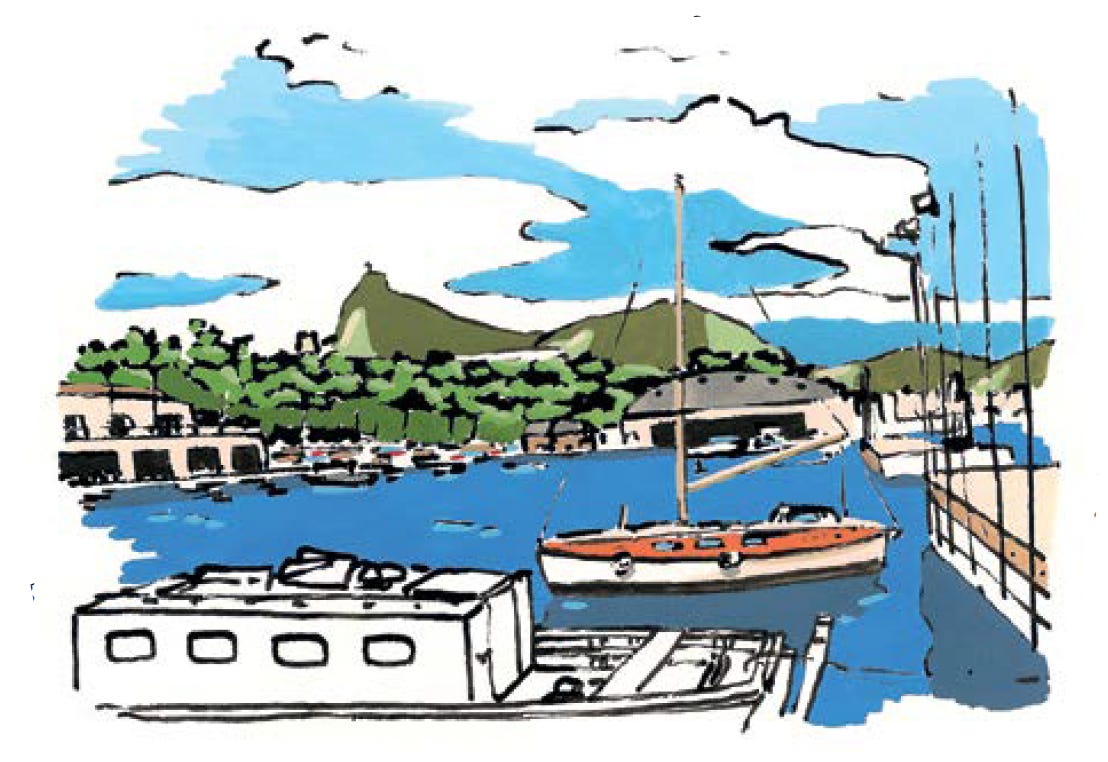
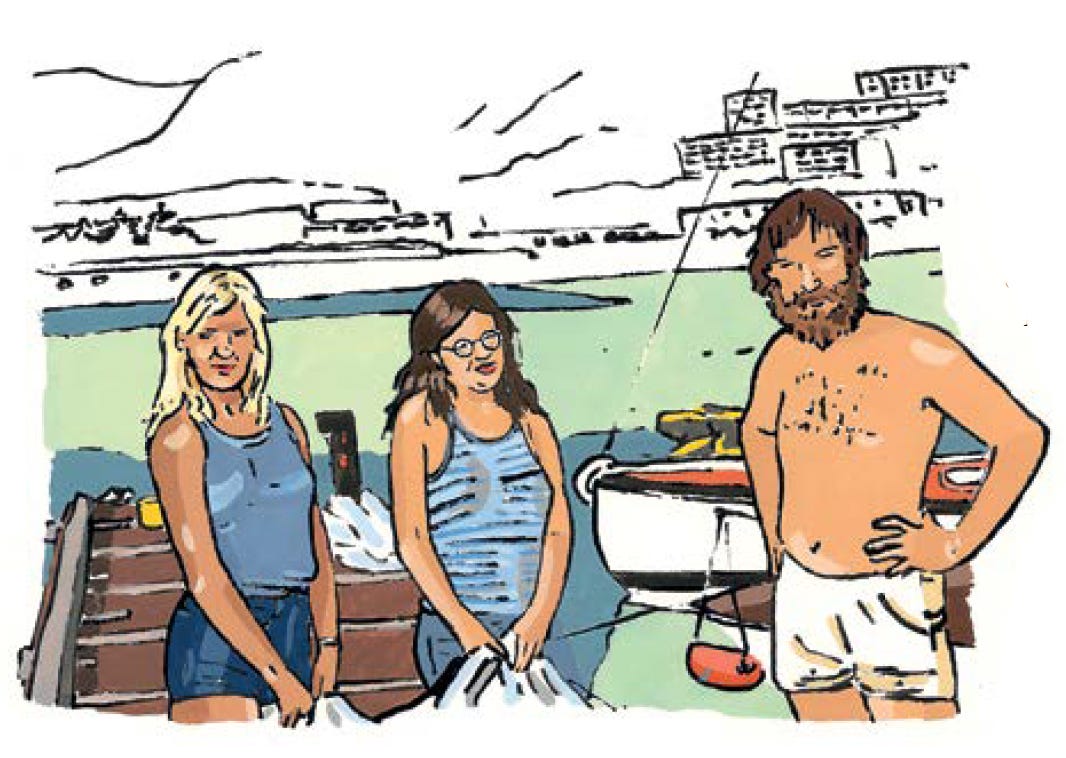
Congrats to Paul Bargren, lucky winner of the new book. —Eds
I would enjoy this book!!